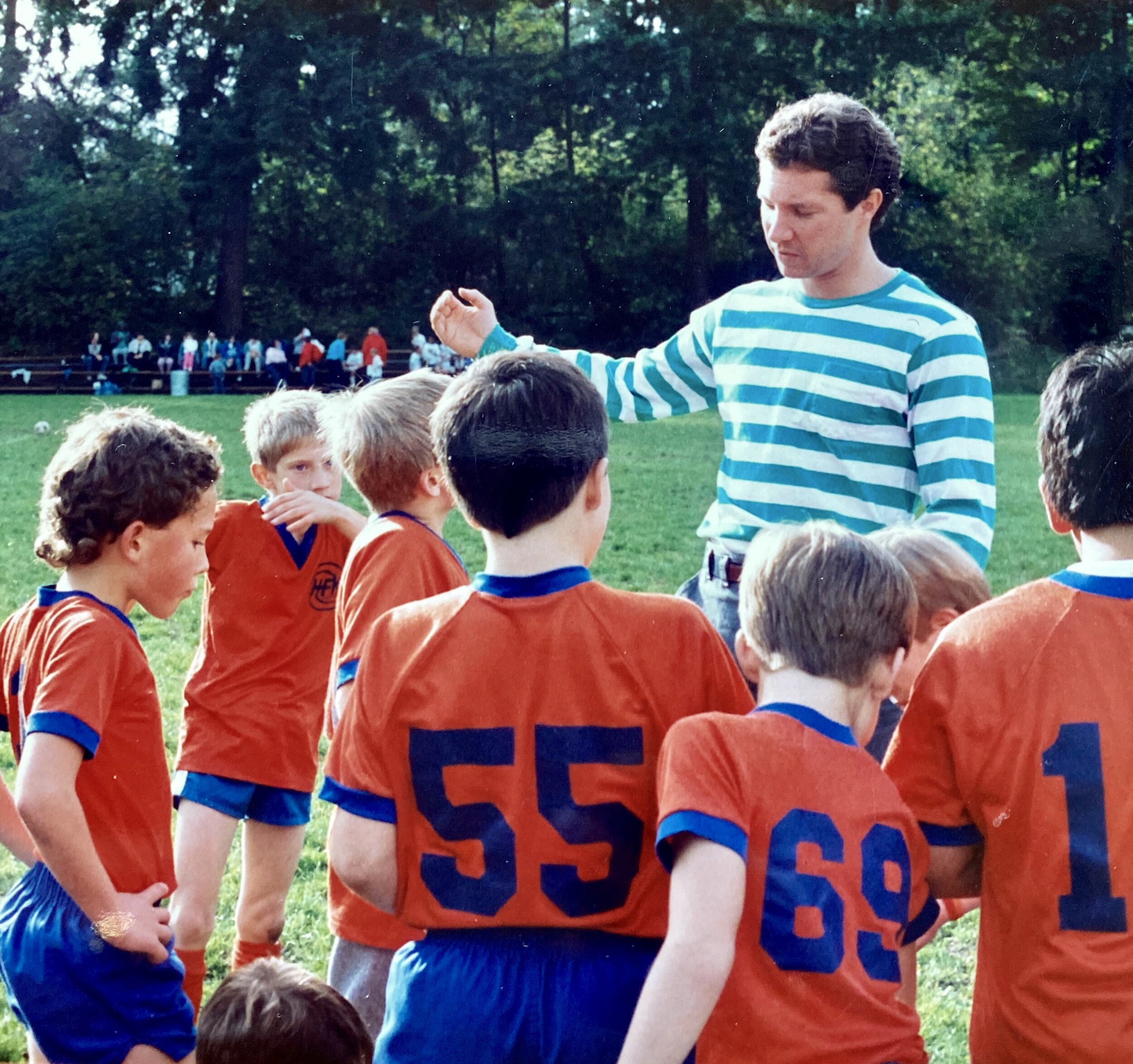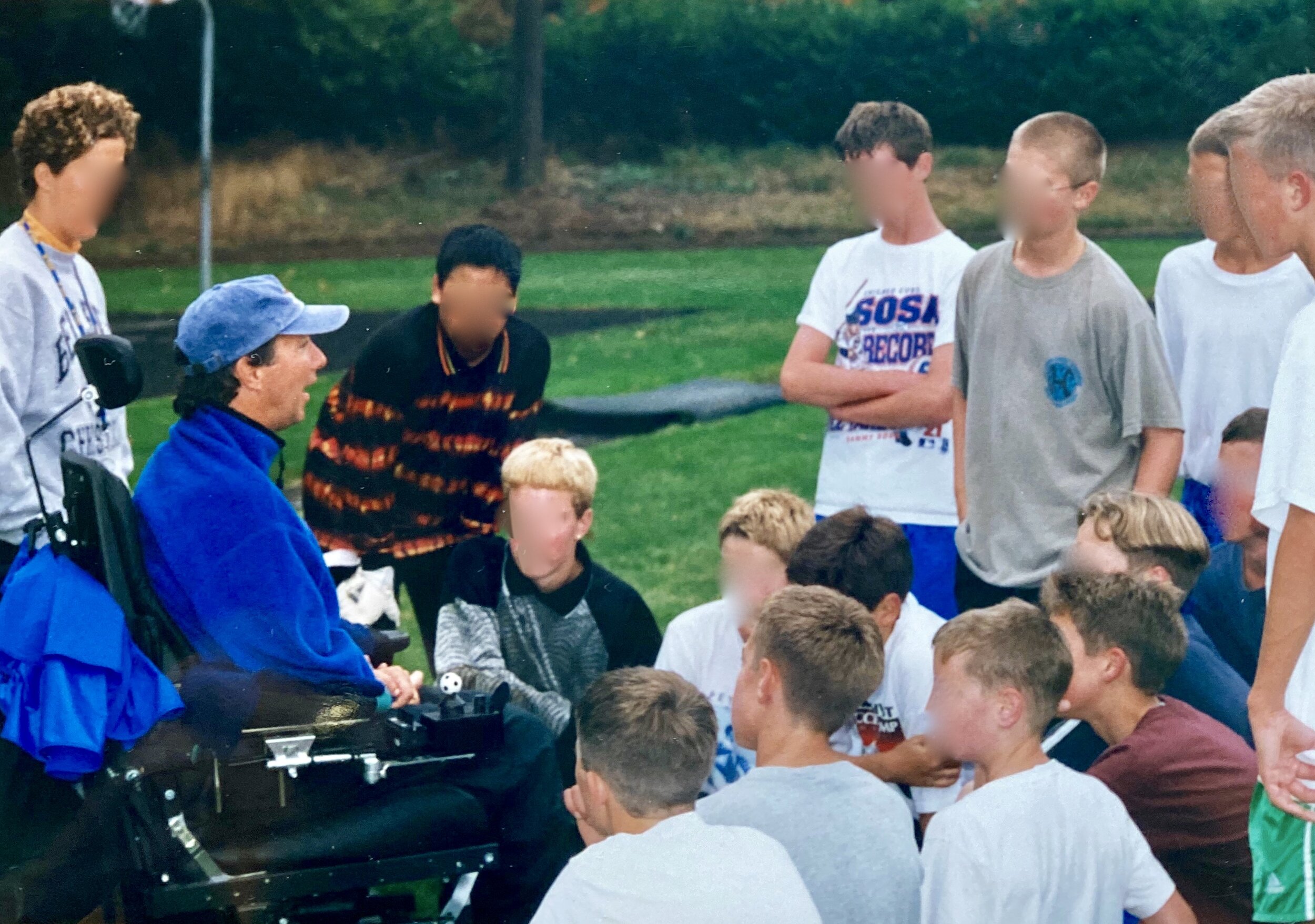A million here, a million there
My dad was far from perfect. He was an asshole more often than not in his youth. He beat up other kids. He called people names. He drank his days away. He broke his nose so many times in fights that he had to have a nose job. The cops arrested my dad here and there, but they always released him to his parents without charges. The cops didn’t beat him. They didn’t see him as a threat despite his black belt ranking. They didn’t kill him. He was white.
My dad had the chance to grow up. To change. To raise me.
He started coaching my brother’s soccer teams when I was a baby, and he never stopped—even when ALS slurred his speech and put him in a wheelchair. He thrilled at seeing hard work pay off in a game. His eyes glowed and he grinned from ear to ear at a beautiful cut or a well-timed nutmeg. He roared at lack of effort. He expected blood, sweat, and tears. If a player had energy left after a game, they didn’t play hard enough.
I was a sophomore in high school when everyone but my immediate family stopped being able to decipher my dad’s slurred speech. So I translated for him. When he needed to sub a player, I’d call them out. When he wanted to change the attack, I’d yell the switch. I stood in for him with refs and opposing coaches.
I watched as players—my high school friends—watched him with reverence.
“Yes, coach.” They’d say to me while looking at him. “Sorry, coach.”
One day when our team bus got lost en route to the field, I approached the opposing coach to negotiate extra warm-up before a playoff-deciding game.
“Who are you?” He asked condescendingly.
“I’m Kevin’s daughter—the coach in the wheelchair,” I said.
The opposing coach reluctantly gave us a few minutes, and my stomach filled with butterflies. We got five minutes to warm up.
We didn’t play well. The game felt chaotic and sluggish. We were down by one or two goals, but—whatever the score—the deficit seemed insurmountable. So—with five minutes left—I tearfully looked at my dad and told him we needed to put all of the seniors in. This would be their last game.
This would be my dad’s last game before he died of natural causes—decades after being arrested. Multiple times. Without ever being harmed.
Racism robs so many people—regardless of whether they act more like assholes, saints, or something between—of the chance to grow up. To change. To raise their kids. And it robs us all of equity.
In How to Be an Antiracist, Ibram X. Kendi explains that any act/thought/policy that increases equity between racial groups is antiracist. Any act/thought/policy that increases inequity between racial groups is racist. There is no middle ground. Everything we do either increases or decreases equity. Intent is not the point. Outcomes are.
When I was little, I learned that repentance means more than an apology. It means turning from the misdeed. Making an about-face. And correcting the wrong.
When we misstep, do we repent?
I recently read that Robert Kraft—who owns the Patriots—is donating $1 million to organizations fighting systemic racism. That’s antiracist. He also donated $1 million to Trump’s inauguration. That’s racist. Donating a million here and a million there doesn’t make you neutral. Has he repented?
About a year ago, I went to a new, white friend’s house. Some noise poured from the open window of a nearby apartment. My white friend apologized for the Black people being so noisy. That’s racist. My stomach knotted, my eyes widened, and I stayed silent. That’s also racist.
I repent.
White America, what are we doing every day to increase racial equity? Where is our repentance? Where is our blood, sweat, and tears for antiracism? If we have any energy left, we’re not fighting hard enough.
Some resources/ideas for what to do next:
Call your police department and mayor to find out about their use of force policies and push them to adopt Campaign Zero’s policies.
Join a march
Join a vigil
Fill your bookshelf with Black, Indigenous, People of Color (BIPOC) writers
Fill your playlist with BIPOC artists
Fill your walls with BIPOC artists
Fill your recipe index with BIPOC chefs
Buy from BIPOC entrepreneurs
Google how to be an antiracist and take suggested actions
Have conversations about racism with your parents, kids, siblings, friends
Call your representatives to push for local and national police reform
Volunteer at an underfunded school
Grieve
Donate
Offer your professional network to BIPOC folks
Fund scholarships
Vote
Repent

